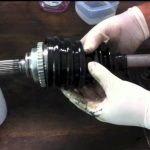
Exhaust pipe carries gas out of the engine of a vehicle. While the car is set in motion, gasoline gets turned into a mixture of poisonous gases generally referred to as ‘exhaust’.
This exhaust has the exhaust pipe as its route of escape from the car’s entire system. Now, the question is, what happens if water gets in your exhaust pipe?
If water gets in your exhaust pipe, it can cause the exhaust pipe to become vulnerable to corrosion because of how metallic it is. Also, if the water is too much, it can increase back pressure substantially and can blow the head gaskets, thus causing the engine to stall.
Can Water Get in the Exhaust Pipe?
Yes, water can get in the exhaust pipe. It is indeed funny how water in its liquid state sustains the potential to find its way through any space no matter how tight-fitted the space may be.
Again, water can get into the exhaust pipe. This can happen through a component of the car experiencing a leak, or out rightly some external factors or events from the remote or immediate environment of the car.
What Happens if Water Gets in Your Exhaust Pipe?
The following are major likely occurrences where water finds its way in the exhaust pipe:
1. The Exhaust Pipe Becomes Vulnerable to Corrosion
Metallic components not designed to hold water face the threat of corrosion and the exhaust pipe is not left out. Corrosion is not some big word.
Corrosion is the decline of a component resulting from its interplay with its environment. This definition covers every form of material, typically relating to metallic alloys.
What comes to mind at the mention of corrosion is rust. I mean, corrosion is often interpreted to mean when a metal rusts. However, you must understand that corrosion is not only about rusting.
While Corrosion includes rust, Rust on its own is a type of corrosion. While Corrosion happens as a result of oxidation, rusting is the oxidation of iron in the face of moisture and air.
2. It Can Increase Back Pressure Substantially
Apart from exposing the exhaust pipe to corrosion, water in the exhaust can cause a head gasket to blow, thus causing the engine to stall.
That is, depending on the level of water that enters the exhaust pipe, it can increase back pressure sustainability, thus causing the head gasket to blow and the engine to stall.
3. It May be a Leak from Somewhere in the Car
Water in the exhaust pipe may be a leak from somewhere in the car, hence, if not fixed, could result in more severe damage affecting other parts of the car.
For instance, white smoke from the exhaust could be caused by an engine coolant leak and could be a severely serious issue.
In other words, the emergence of white smoke from your exhaust may be an indication of the accidental entry of coolant into the combustion chamber. As the coolant burns within the block, thick white smoke emits through the exhaust.
Also, if pressurized water is shot into the exhaust pipe, the muffler could be flooded. This results in sufficient blockage, causing rough idling and hot water splash from the exhaust. While severe damage may not be caused, it does no pleasant good to the car.
Water dropping down the exhaust pipe of a car is not fit for a cause of alarm save such a situation where the water or fluid, as the case may be, has a color.
In the event of a continuous and excessive occurrence of the smoke color white, it could mean a gasket or cylinder head failure.
In the ordinary course of events, the exhaust pipe is a component strictly for the eviction of poison in the form of gas from your car.
Hence, it is supposed to be a completely free passage void of the slightest or toughest of congestions.
If water then gets in it, already such can be likened to a ‘pest,’ or ‘weed’ -as unwanted as possible thus hindering the normal process and causing the pipe to face harsh conditions in its discharge of exhaust.
What to Do If Water Gets in your Exhaust Pipe?
Decipher what water it is and where? If it is water from any component of the vehicle, then it could be due to a defective connecting pipe, faulty head gasket, piston malfunction, thus, the fault with faulty components should be fixed.
Also, if it is water from flood, rain, or erosion that causes the exhaust pipe to be submerged, once noticed, drive uphill. This way, the water flows out, then you can clean your pipe and save it from rust.
How Do You Know There is Water in Your Exhaust Pipe?
Following the regular course of operation, the exhaust system of the vehicle should not emit water. However, should your attention be drawn to your tailpipe leaking or dripping water, you know you have water inside your exhaust system.
Can Water Get into Engine through Exhaust Pipe?
No. Water is not likely to get into the engine through the exhaust pipe. Even it is broken exhaust, the chances of water entering your engine are low because of how high most manifolds are.
There is an exhaust-muffler system whose tailpipe water can enter, particularly in a static car, though it can happen when the car is on motion upon sufficient back-pressure.
However, this does not automate that water will find its way into the engine. The height of certain manifolds will not allow it.
Can Water in the Exhaust Cause White Smoke?
Yes. In clear words, white smoke suggests that somehow, water or engine coolant leaked, penetrating the combustion chambers, accidentally. There is an explanation for every blue, white, or black smoke that you notice.
Where white smoke is excessive, it could be an expression of a bad head gasket.
Condensation in the exhaust pipe resulting in steam could be the explanation for your white smoke. For emphasis, excessive amounts of white smoke also could indicate head gasket failure.
Final Thoughts
Exhaust pipes are designed as exhaust outlets. While no external phenomena must be allowed to penetrate the exhaust pipe from any environment, anything not ‘exhaust’ must neither occupy the pipe nor escape through it.
If it happens that the exhaust pipe is occupied by any other things, you should give immediate attention to the eviction of such. Should the obstruction be left to persist, or the escaping fluid is ignored, you may have multiple visits to mechanical workshops to plan, inevitably.









